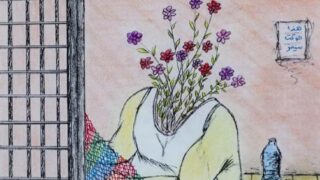
This publication has benefited from the support of the Rosa Luxemburg Foundation. This text may be reproduced in part or in full, provided the source is acknowledged.
Sexual harassment of women (1) is one of the most prominent forms of socially justified violence in Egypt. The issue is not recent and has been raised since the 1940s after repeated cases of collective verbal harassment, which developed into cases of physical assault in the early 1970s. The curve has since accelerated upward, turning harassment into a societal and political means of pressure and repression. Despite acknowledging the need to deal with it decisively, social and official dialogues have often ignored addressing harassment as a crime. They deliberately shifted their attention towards other issues, such as the administrative and economic empowerment of women, circumventing the question of sexual harassment by presenting women's issues from an exclusively developmental and economic perspective.
Only when female political activists and journalists were sexually harassed in 2005, did organizations and institutions concerned with women's rights start to define sexual harassment as “gender-based violence” inflicted on Egyptian women. The incident, which became known as Black Wednesday, constituted a pivotal moment in crystallizing and introducing the concept to human rights circles. It was the starting point of a feminist movement that has continued to this day. Successive movements and initiatives, led mainly by women, have since emerged to combat harassment and violence against women and have achieved wins at the public and official legislative levels.
Victory in the long battle of law
In the first sexual harassment case in October 2008, the court issued a ruling in favor of filmmaker Noha Rushdi, sentencing her harasser to three years in prison. That sentence was considered the first official recognition of harassment as a crime in Egypt; it sparked social controversy and widespread media attention.
In 2011, the authorities considered amending and adding nine new articles to Penal Code No. 58 of 1937 due to the legal shortcomings in dealing with this crime. They discussed the tightening of the penalties contained in Articles 267, 268, 269, 269 bis, 288, 289, and 306 bis (a), and the addition of the new article 290 bis that states that Article 17 of the Penal Code shall not be applied. Since the January 2011 revolution, voluntary campaigns documenting and reporting cases of violence and sexual harassment have emerged to provide support to victims.
These campaigns paved the way to Presidential Decree No. 50 of 2014, where the word 'harassment' was mentioned for the first time. This has been the most crucial legislative development in the history of the movement against gender-based harassment and violence. According to the amendments, “carrying out sexual or obscene gestures on a public road or a frequented place in any manner, including by modern means of communication,” is considered a crime. The amendment states that if the harassment is done "with the intent of receiving sexual gratification from the victim, the punishment shall be a term of imprisonment of not less than one year and a fine of EGP10,000 -20,000 (about $522-1,044) or one of the two penalties.”
Sexual harassment has become part of the popular discourse after the sexual mob attacks on young women in downtown Cairo in 2006 during the Eid al-Fitr holiday. The following years also witnessed high daily rates of verbal and physical harassment of women. What is new in these incidents is not only the societal denial of their occurrence but also the authoritarian complicity in them.
Since the January 2011 revolution, voluntary campaigns documenting and reporting cases of sexual violence and harassment have emerged to provide support to victims. These campaigns paved the way to Presidential Decree No. 50 of 2014, where the word 'harassment' was mentioned for the first time. It is the most crucial legislative development in the history of the movement against gender-based violence.
In 2017, the House of Representatives discussed a draft to amend some provisions of the Penal Code that could increase the penalties for the crime of sexual harassment stipulated in Articles 306 bis (a) and 306 bis (b). It also discussed creating the new article 306 bis (c) to deter the crime of harassment of people with disabilities. In 2021, the authorities approved amendments, bringing the penalty to seven-year imprisonment. The amendment to Article 306 bis (b) touched on the possibility that the perpetrator might be in a position of power, or might put pressure on the victim if he were a family or a work authority.
Harassment as a weapon of power and patriarchy
In May 2005, the political scene was boiling due to constitutional amendments, especially that of Article 76 which was dubbed the ‘power inheritance license’. When they staged a protest at the Journalists' Syndicate in downtown Cairo on 25 May 2005, the organizers did not know that that date would be decisive not only in the history of political confrontations between the authority and the opposition but also in the history of Egyptian feminism and its struggles. The scene of the attack on the female journalists Nawal Ali, Abeer al-Askari, Shaymaa Abu al-Khair, and Iman Taha was a watershed separating two eras. The first was an era of hushed violations against women, and the second represented the public announcement of the beginning of women's struggle against violence and harassment. Security forces resorted to physical violence against women, in particular, to thwart peaceful protests. It was the first political confrontation in which the authorities used violence against women (2).
The four female journalists fought a fierce battle afterwards. They first headed to the police station, which initially refused to file a complaint report against the state in the case of sexual assault. Then, they resorted to the Office of the Prosecutor, which ordered the file to be closed as a complaint against persons unknown. For the first time, a movement against political and sexual violence called "The Street is Ours" emerged to condemn the silencing of the opposition and the authorities' attacks on female activists. The journalists also resorted to the African Commission on Human and Peoples' Rights in 2006 and obtained a historic ruling in March 2013 condemning the Egyptian government and compensating them for physical and psychological damages.
However, sexual harassment has only become part of the popular discourse after the mass assaults on young women in downtown Cairo, which took place on Eid al-Fitr in 2006. The following years also witnessed high daily verbal and physical assaults against women, but what was new in these incidents was not only the societal denial of their occurrence but also the authoritarian complicity in them. While society stigmatizes the victim and blames her alone, the authorities refuse to acknowledge the facts, and victims are often sent home without a police report.
In 2011, Egypt had a few organizations that discussed women's issues from a feminist perspective. These organizations were specifically: New Woman Foundation, Nazra for Feminist Studies, the Center for Egyptian Women's Legal Assistance, and the Egyptian Center for Women's Rights. In 2008, the latter published the first survey study, Clouds in the Sky of Egypt, which indicated that 83% of women in Egypt have been sexually harassed. In 2010, the fiction film "678" told a story that argued that the primary cause of harassment was the sexual frustration of men linked to their low economic status.
Before the 2011 revolution, the movement against sexual harassment was limited to the work of some human rights organizations (3) and the individual struggles of women working in the public sphere. However, as the revolution unfolded, sexual harassment became a major issue in public debates due to the emergence of violent mass harassment waves, as women were targeted by the opposing parties (the security forces and some Islamist groups). Perhaps an outstanding example of security personnel harassing women was during the “One Million Women” demonstration in March 2011. The army arrested 17 female activists and conducted “virginity tests” on them, which were considered sexual assaults against female protesters. The events that followed revealed the existence of organized groups ordered to create circles in which they would commit mass assaults and gang rapes. During those sexual mob attacks, women have been groped, stripped naked, and beaten with sharp objects. The escalation in these practices continued until the day of the inauguration of President Abdel Fattah El-Sissi in 2014 when young women were subjected to sexual harassment in Tahrir Square. However, that day represented the beginning of the end of mass harassment incidents. It ushered in a new phase of the feminist movement led by human rights organizations, fortified by the power of social media campaigns.
The feminist movement stands up to sexual harassment
Due to the spread of the phenomenon and the authorities’ failure to confront it in the events that followed the 2011 revolution, the anti-harassment feminist movement emerged on several levels; the first of which was the formation of independent field groups, which included young women trained in dealing with sexual assault (4) during protests, gatherings, or holidays. Despite the attempts made by the governmental women’s committees, in conjunction with feminist organizations, to submit proposals for laws against harassment, the official state discourse has, until recently, refused to acknowledge the presence of the widespread phenomenon. Not only that, the state has accused female activists of fabricating allegations to discredit Egypt in international forums. There have been attempts to silence women by defaming them as a means of pressure from the authorities and from their social environment, which often refuses women's disclosure of their exposure to this crime, considering it a stigma.
Independent groups on the ground
The sexual assaults that happened in Tahrir Square in November 2012 were a turning point. With the absence of the role of the official authorities and political parties’ calls for demonstrations, the first anti-harassment field groups appeared. The Force against Harassment (5) was a group that refused to limit the role of its volunteers to administrative coordination, transcending that to participation in rescue teams and field interventions. For the first time, women were acting as the defenders of women, rejecting the patriarchal protective role.
Due to the spread of electronic harassment and extortion, online groups also emerged to fight harassment and defame the harassers. At the same time, the authorities dealt with the incidents published by these groups in a different manner. In some cases, the Public Prosecution began to file lawsuits on its own based on the incidents mentioned on social media websites (6). However, the group’s role ended with the ouster of President Morsi in 2013.
Apart from the demonstrations, self-defense clubs appeared in 2013. Adopted by initiatives such as Window Egypt, those clubs have offered women-only self-defense workshops. They have worked to change women's long-standing perception of themselves as "unable to protect themselves."
And outside Cairo…
The growth of the feminist movement after the revolution was one of the reasons for its decentralization. Far from the capital, which was the scene of most reported sexual harassment incidents, young women launched initiatives in Upper Egypt governorates which are characterized by closed social structures and extremely strict norms. Perhaps the most prominent of these initiatives is “A Free Southern Woman” in Aswan, “Dorek” (“Your Turn”) in Qena, “Ishtar” in Minya, and “Honna” (“They”) in Assiut. They launched these initiatives after sexual harassment crimes that amounted to murder, as happened with the “female martyr of harassment” in Assiut in 2012. With these groups, activism against sexual violence began to crystallize in those regions, carried by the emergence of women’s desire to defend themselves. Those initiatives were not limited to elite women or female intellectuals; they were able to extend to some grassroots circles.
Nazra: an institutional feminist struggle
Nazra for Feminist Studies has played a leading role in raising the issue of sexual harassment in a political framework with the state, political parties, unions, and universities. It has published a study entitled: "On Sexual Violence against Women." It also created a training program for female human rights defenders to introduce them to the terminology necessary to understand issues of violence against women from a feminist perspective.
Due to the spread of the phenomenon and the authorities’ failure to confront it in the events that followed the 2011 revolution, the anti-harassment feminist movement emerged on several levels; the first of which was the formation of independent field groups, which included young women trained in dealing with sexual assaults during protests, gatherings, or holidays.
Due to the spread of electronic harassment and extortion, online groups have emerged to fight harassment and defame the harassers. At the same time, the authorities dealt with the incidents published by these groups differently. In some cases, the Public Prosecution began to file lawsuits on its own based on the incidents mentioned on social media websites.
For instance, Nazra and other human rights organizations intervened after a female law student at Cairo University was sexually harassed in 2014. It was an opportunity for these groups to respond to the university president, who initially blamed the victim. However, a feminist online campaign bearing the hashtag #The_first_time_I_was_sexually_harassed_was has helped thousands of young women disclose crimes of sexual harassment they had been subjected to since their childhood. Here, several organizations, including Nazra, submitted a project to the university president to create a committee to decide on complaints from female students who have been sexually harassed. It soon evolved into a "Unit to Combat Violence against Women." Also, the state showed official recognition of the efforts made by the feminist movement when its National Council for Women adopted the idea and implemented it in Egyptian universities.
Through its campaign “Qanun Nashaz” (“Unlawful Law”) for the elimination of legalized violence against women, Nazra did not welcome the legal amendments approved days before El-Sissi took office and criticized Article 306 bis (b). In 2017, Nazra allied with eight feminist organizations (7) to launch a campaign entitled "The Task Force for a Unified Law to Combat Violence against Women."
The Internet as an alternative arena
In 2015, the fieldwork groups stopped working due to the cessation of demonstrations, the reduction of political activity, and the rise of the new regime. Meanwhile, groups like HarassMap, founded in 2010, stepped into the cyber arena, using data mobilization, GIS technology, and SMS to locate cases of sexual harassment, in an innovative way to locate and document cases.
Al-Azhar, Egypt’s most prominent religious institution, reacted strongly, releasing statements confirming its rejection of the crime of sexual harassment and its justifications. On the cover of its September 2018 issue, Sawt al-Azhar newspaper published pictures of women in solidarity. They included women without headscarves to emphasize Al-Azhar's opposition to sexual harassment regardless of a woman’s attire, marking a new era in which the religious authority is moving away from supporting and justifying harassment.
2017 marked the beginning of one of the largest public feminist campaigns through online testimonies, with women using the hashtag #MeToo to expose harassment and misconduct. Thousands of tweets described acts of violence inflicted on women. The following year, a human rights activist published her testimony on the Femi-Hub Facebook page, accusing a politician and a human rights lawyer of sexually assaulting her. What was known as the “email incident” had exposed sexual harassment within human rights circles and civil society organizations. Dozens of other online testimonies of female human rights defenders who were harassed by male human rights defenders and those in positions of power have been shared.
In 2020, an Instagram account by the name of Assault Police shared the testimonies of survivors of sexual assaults committed by Ahmed Bassam Zaki, a student at the American University in Cairo, under the hashtag #rapist_Ahmed_Bassam_Zaki, which topped Twitter trends until his arrest. The account then continued to publish testimonies of women harassed and raped by young men belonging to influential families in what became known as the Fairmont Hotel case. In the same year, feminists launched a blog called Daftar Hikayat (The Book of Tales) to enable others to publish their stories and expose harassers. It was through this platform that the most interactive hashtag #we_believe_survivors appeared. Moreover, a platform called Speak Up has contributed to the publication of several testimonies of women - some of whom were sexually assaulted within the church community.
Entanglements with the state
The sexual harassment of young women in Cairo’s Tahrir Square during the celebration of El-Sissi's inauguration as President in 2014 marked a new turning point in the authority's handling of these cases. As part of the authority's recognition of the seriousness of harassment as a phenomenon, the courts handed down prison sentences ranging from 20 to 25 years. These rulings were the first of their kind in mass sexual assault cases. However, it is worth noting that the courts handed down these rulings based on charges of rape and indecent assault, not sexual harassment. That urged the feminist movement to re-demand the amendment of Articles 267 and 268 of the Penal Code to broaden the definition of rape. In response, the Ministry of Interior established a department to follow up on crimes of violence against women. The 2014 constitution, which some women participated in drafting, was one of the milestones in which gains were made in support of the feminist movement. This was evident in Articles 11, 101, and 104 of the Constitution. On the other hand, the National Council for Women approved the National Strategy to Combat Violence against Women in 2015.
In 2015, the fieldwork groups stopped working due to the cessation of demonstrations, the reduction of political activity, and the rise of the new regime. But groups like HarassMap, founded in 2010, have stepped into the cyber arena, using data mobilization, GIS technology, and SMS to locate cases of sexual harassment, as an innovative way to locate and document harassers.
Under pressure from independent feminist activists on online platforms and feminist institutions, the House of Representatives agreed to amend some provisions of the Criminal Procedure Code in 2020. It also allowed adding Article 113 bis, which obliged investigative judges not to publish victims' data. This was considered a new victory for the feminist movement.
Regarding the official religious state institutions, Al-Azhar has reacted strongly to the issue, producing several statements and gestures confirming its rejection of the crime of sexual harassment and its justifications. On the cover of its September 2018 issue, Sawt al-Azhar newspaper published pictures of women in solidarity. They included women without headscarves to emphasize Al-Azhar's opposition to sexual harassment regardless of a woman’s attire, marking a new era in which the religious authority is moving away from supporting and justifying harassment.
In conclusion, the feminist movement in Egypt has succeeded in addressing sexual and gender-based violence against women as a key issue, complementing the efforts that preceded the 2011 revolution. The movement also helped correct some concepts related to women’s bodies, self-image, and stereotypes. As a result, women from slums and marginalized areas were coming forth, declaring that they, too, have survived sexual harassment and assault, even filing complaints against perpetrators in police stations, even though most disclosures still come from the generation of young and college-educated women.
The content of this publication is the sole responsibility of Assafir Al-Arabi and Rosa Luxemburg Foundation cannot accept any liability for it.
Translated from Arabic by Sabry Zaki
Published in Assafir Al-Arabi on 12/07/2022
1- Cairo was named the world's most dangerous city for women, according to a 2017 poll conducted by the Thomson Reuters Foundation, a summary of which was published by the BBC in Arabic. The survey sparked discussion on several media websites. However, Egypt's National Council for Women (a governmental body) rejected the data contained in the study, stressing that it focused on harassment without addressing other measurement criteria.
2- According to the testimony of female activists from the Youth for Change group, the women were beaten and sexually assaulted by organized groups of hired men. On the following Friday, they organized a demonstration at the Journalists Syndicate to denounce the incident known as Black Friday. The Journalists Syndicate also declared mourning, covering its walls in black.
3- For several years, sixteen non-governmental organizations from various governorates formed a “Task Force against Sexual Violence” as an umbrella for joint work on sexual violence issues. They submitted a proposal to amend the Penal Code for crimes of sexual violence in 2010.
4- The participating young women had received psychological and physical training to qualify them to defend themselves and others against assault, whether individual or collective.
5- It formed in conjunction with the groups "I Saw Harassment" and "Tahrir Bodyguards."
6- The Force Against Harassment group cooperated with the Egyptian Initiative for Personal Rights, the Egyptians Cooperative for Popular Media, the HarassMap group, Nazra for Feminist Studies, the “I Saw Harassment” initiative, the El-Nadim Centre for the Psychological Treatment and Rehabilitation of Victims of Violence, and the Nafsi initiative, Baheya Ya Masr, Al-Masry al-Hurr (Free Egyptian), and Bussy (Look) project.
7- The coalition included: The New Woman Foundation, Nazra for Feminist Studies, the Center for Egyptian Women's Legal Assistance, the Cairo Center for Development and Law, the Foundation for Women and Memory, the El-Nadim Centre for the Psychological Treatment and Rehabilitation of Victims of Violence, the Appropriate Communication Techniques for Development Center, the Egyptian Women Lawyers Initiative, and the Tadwein Center for Social Gender Studies.






